What Comes After COVID-19?
Santa Barbara’s Leaders and Visionaries Reflect on the Region’s Post-Pandemic Future
By Indy Staff | Published June 11, 2020

One month ago, the Santa Barbara Independent emailed a simple survey to more than 100 of the region’s top thinkers, leaders, and visionaries, from academics to artists and politicians to entrepreneurs.
Noting that it was far too early for much more than pure speculation in this unprecedentedly uncertain era, we asked three things: What they believed would happen when the world emerges from the COVID-19 pandemic, what they hoped would result, and what they most feared. More than three dozen responded, delivering insightful thoughts on the future to be.
In just four weeks — a calendrically short yet experientially long stretch — much has changed for the United States and the world at large. Protests surrounding the Minneapolis police suffocation of George Floyd have gripped our collective attention, pushing pandemic realities a bit to the back burner, even as the virus continues to kill many around the globe.
When we finally dusted off these survey results last week, there was concern that they’d be outdated, that the situation had evolved so much that responses would be lacking gravitas. Instead, given that so many worried about inequality and that so many expressed optimism for positive change, the survey resonated almost more loudly.
In next week’s Independent, we will be reflecting deeply on the June 19 holiday of Juneteenth, which celebrates the end of American slavery, and the modern plight of African Americans and people of color in Santa Barbara. For this week, we are letting our leaders reflect on the future for all of us, no matter race, creed, or status.
What follows is a selection of responses from our post-pandemic survey.
—Matt Kettmann
Joyce Dudley, District Attorney
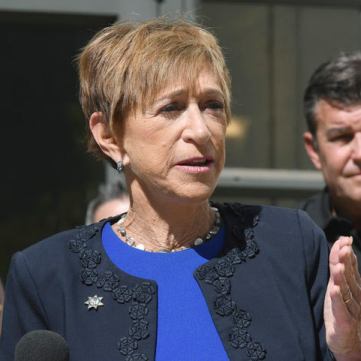
I believe we will slowly learn about what people are now experiencing. I believe we are now increasing in-home crimes: domestic violence; spousal rape; child, elder, and animal abuse. I expect that my staff will be working harder than ever trying to evaluate these cases in order to ensure justice for all.
Brian Cearnal, Architect
I fear that, without positive change, we have too many existential risks facing mankind. I fear a global collapse that leads to only more tyranny and oppression. I fear complacency.
George Eskin, Retired Superior Court Judge

A judge can handle only one case at a time, and attorneys, their clients, and witnesses (especially law enforcement officers) currently waste a lot of time waiting for their case to be called. Electronic remote procedures should have the positive effect of reducing wasted time.
I fear that social interactions we have cultivated, such as shaking hands and hugging, will disappear.
Brandon Ristaino, Owner, The Good Lion, Shaker Mill, Test Pilot
We hope that this pandemic will bring systematic changes to our health-care system, our communicable-disease emergency preparedness, and to inequality in access to health care across our country. We also hope that our community leaders will use this as an opportunity to reforge the identity of Santa Barbara in an effort to rise from this pandemic in a position of economic and community strength.
Kostis Protopapas, Artistic Director, Opera Santa Barbara
I hope that the world will be more efficient. We’ve adapted to conduct business remotely and without traveling, so telecommuting will remain the norm for those industries that can function that way. The nonprofit sector will shrink, with the fittest and most essential surviving.

I fear a post-9/11 scenario led by fear and dumb decisions. Political polarization will be accelerated. The recovery from COVID has to be city by city, county by county, state by state. The worst that can happen is to try to impose one-size-fits-all solutions.
Zohe Felici, Owner, Felici Events
I fear no events in 2021, no vaccine, another year down the drain….
Bob Stout, Owner, Wildcat Lounge
I fear that 30 percent of businesses go out of business if landlords don’t forgive some rent or extend leases with present time deferrals. Empty spaces happen. Rents come down. This happened in the 400 to 600 blocks of State Street in the 1980s and ’90s. A lot of young entrepreneurs started restaurants and bars there because the rent was half of what it was uptown. Now the 500 block has 14 restaurants. The 900 to 1000 blocks have four combined.

Ernesto Paredes, Executive Director, Easy Lift
I hope for a more hygienic community and recognition for the welfare of homeless and their health needs.
Geoff Green, CEO, SBCC Foundation; Chair, S.B. Chamber of Commerce
I believe that, 10 years from now, we’ll look back and talk of the wave of innovation that was spawned by the COVID-19 pandemic. If necessity is the mother of invention, this pandemic has been the mother of all mothers. Some of our adaptations will surely stick and become “standard operating procedure.” Others will fall away.

I hope that this radically changes our national debate about health care as a human right, universal high-speed broadband access as a necessary public utility, and the fact that our undocumented neighbors as essential workers.
I fear that if we don’t seize the moment to push through massive policy reforms that reverse the current four-decade-long trend of increasing economic inequality, we will lose the opportunity. No other event in my lifetime has brought our gross economic equality and racial equity gaps into starker focus than this pandemic. Now that everyone can see it, we need to act to change it.
Lucas Zucker, Social Justice Advocate, CAUSE

I believe that heavy unemployment among immigrant service workers excluded from the safety net will result in major housing displacement after eviction freezes lift, particularly in neighborhoods already under gentrification pressure like the Eastside and Westside.
I hope this will push City Council to take bold action on housing affordability and that employers of domestic workers and hospitality workers will step up to meet the needs of their employees.
I fear this will be the tipping point for whole neighborhoods, and landlords will see this as an opportunity to permanently flip their buildings from catering to low-wage immigrant service workers to white-collar young professionals
Victor Rios, Associate Dean of Social Sciences and Professor of Sociology, UCSB
I believe that the post-pandemic era will bring about a new politics of health and health literacy in everyday people. Prior to COVID-19 people did not think too much about health issues unless they or their loved ones became ill. COVID-19 has provided an impetus for a majority of the population to become proactive in health.

Post-pandemic citizens will consume more vitamin C, keep their hands and surroundings sanitized and clean, and work out on a regular basis at higher rates than before. Voters will support politicians who promote health as a top priority in their four-point platforms. Schools, businesses, and workplaces will have to provide curriculum, resources, and insurance services for these newly evolved humans who are expecting to learn more about health and well-being and demanding that their health-care and well-being needs are addressed on a day-to-day basis. Post-pandemic humans will navigate this world seeking out quality, affordable, and ubiquitous systems of health care and well-being.
I fear that the long-term negative effects of the pandemic will lead to strained social relations in our community. Even long after a remedy for COVID-19, fear will linger in our community. We will be afraid of talking to one another, afraid to greet each other, and afraid to gather in communion. Xenophobia, a fear of other ethnic groups, especially fear of Asian Americans, may form a cloud over us, obfuscating our ability to see each other as fellow human beings.
As important as it is to take care of our own tribes, it’s equally important to teach our families, children, and friends about the histories, contributions, and struggles of our neighbors who are of different racial and ethnic backgrounds. By helping to create false narratives of others, fear estranges us from our own humanity.
Silvia Perea, Director, UCSB’s Art, Design & Architecture Museum
I hope we can exchange hugs with our patrons instead of emails.
Alison Laslett, CEO, Santa Barbara Vintners
I fear that the creativity of our wine industry to find a way to reach its people will not be allowed. We could pour in the parking lots, eat under the stars, spill into the streets to keep each other safe. I fear that our old ways of thinking will hamper our new solutions.
Irwin Appel, Professor and Chair, UCSB Dept. of Theater and Dance
Already, exciting and innovative ideas are coming out of this difficult time. While certainly not ideal for what we do, Zoom has emerged as a new medium, a hybrid between live and filmed performance. I hope that in both theater and university education we will continue to use this new medium to reach audiences all over the globe. I have already been a guest speaker in classes in China and Poland on Shakespeare. I am looking forward to establishing more connections that weren’t possible before and do this all over the world.
George Short, Attorney (Brownstein Hyatt Farber Schreck, LLP) and Active Nonprofit Boardmember
I fear that the political, social, and cultural divisiveness in our country and the world will be exacerbated, not diminished. I fear that the live music industry — and especially the Santa Barbara Bowl and SOhO — will never be the same.
My very worst-case scenario? The Santa Barbara Independent, already dealing with the economics of journalism, will not survive, leaving no other rational group of news reporters in our community.
Sarah York Rubin, Executive Director, Santa Barbara County Office of Arts & Culture
Arts and cultural organizations are creatively pivoting service models in their spaces as well as nontraditional venues. I imagine more public music, artwork, lessons, and films incorporated into our built landscape.

Historically, arts and culture serve as a mirror, providing opportunities for society to process, reflect, express, learn, and grow. I hope that artists will be recognized as essential leaders in visioning and actualizing our next steps. We are always better for their participation, and their out-of-the-box thinking will open up dynamic futures that increase our opportunity to engage with and celebrate each other.
We are at risk of permanently losing essential cultural institutions and venues that enliven our community and provide its roots. Their contribution is priceless and irreplaceable; without broad-scale support, the landscape that we love so much may starkly change forever.
Ashleigh Davis, Community Outreach Supervisor, Montecito Bank & Trust
I believe we will all find a productive and sustainable “new normal” that brings forth new priorities and world views. Everything will be different yet just as it’s meant to be. Human interaction will likely never be the same and our appreciation for the simple things in life will outweigh materialism and greed. Everyone is starting from square one and it’s up to each of us to find the best path for moving forward. The need for collaboration and understanding is greater than ever!
Sigrid Wright, CEO, Community Environmental Council
I believe this will be a final death blow to many small businesses, restaurants, and small farmers that had barely recovered from the Thomas Fire. The social sector will suffer greatly, right when we need more of their services, and many nonprofits will also likely fold.
Without firm and creative leadership from local governments — in partnership with the business sector and the social sector — our region will suffer economically for at least a couple of years. This leadership will need to be capable of addressing several joint crises at once (public health, economic, environmental). I also believe this will not be our last crisis, maybe not even the last one this year, as we experience greater impacts of climate change (i.e. extreme heat, extended wildfire seasons).

I hope that we can get creative and use this opportunity to really look at developing a sustainable region — sustainable in all senses of the word. This may mean exploring much more decentralized systems for basic needs (food, energy, water), building neighborhood-level capacity, and drawing on more local leadership to tackle the design challenges. I hope that leadership can emerge from more diverse pockets of the county in a way that draws from more voices, not just a handful of people with resources.
I fear that we’ll be so overwhelmed by cascading and overlapping problems that we will be in a constant state of triage, unable to do much more than apply Band-Aids. I worry that certain segments of the community will focus on building their own lifeboats, and that those who are most affected by these overlapping crises will have the least amount of control or voice.
I worry that we’ll come out the other side of this having crushed small businesses, farmworkers, and restaurants, and that we’ll be ever more dependent on Costco and Amazon to feed us.
David Fortson, CEO/Cofounder, LoaCom
I fear a return to “normal” that primarily served the privileged. I fear that hugs will be in short supply for a long time. I fear being unable to go to a festival or live music with my fellow community members. I fear that the economic devastation will disproportionately hurt the less advantaged members of society for years to come. I fear we won’t be bold enough to propose the big ideas and disruptive changes that serve to regenerate our relationships to each other and the planet.
Mike McGrew, Retired Police Sergeant; CEO/Pastor, At Ease First Responder PTSD Program
People will have spiritual awakenings and begin to encounter God’s grace as they seek resiliency and restoration in their lives and the lives of their neighbors. A synergy of helping one another will be created as we experience the fruits of providing help for each other. Powerful testimonies of hope will bring peace and strength to communities, and sharing our hearts’ burdens and victories will create inner strength to move forward and with empathy and kindness for one another.
Becky Barieau Wathen, Co-Owner, Foxen Winery
I believe travel will be focused on local trips to the S.B. area from Los Angeles, rather than risky plane rides. That bodes well for winery tasting rooms, but we will all, at least temporarily, convert to appointment only to control the numbers present at one time. For wineries, e-commerce has exploded. I don’t think it will stay as active as it is now, but it will never go back to the level it was at before.
Salud Carbajal, U.S. Representative
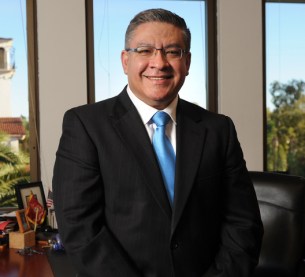
I hope we will learn from this pandemic challenge and put in place contingency plans to better deal with a similar crisis in the future.
Frank Ochoa, Attorney/Arbitrator/Mediator; District Elections Committee Member
I would hope that the current calamity will bring us together as a people with a common purpose. Courts will eventually reopen, but people may, by then, have obtained a healthier respect for conciliatory dispute resolution processes.

Knowing the courtroom, it can be a destructive and dehumanizing way to resolve disputes. If the undiscriminating menace to us all leads to circling of the wagons and causes us to sit and talk instead of going to the figurative battleaxes and broadswords of the courtroom, we will have evolved on the path of peaceable coexistence.
I fear that we learn no lesson. We continue on selfish, divisive, destructive paths. We continue to resort to name calling, embarrassment, and diminishment of others who differ from or disagree with us.
Sherry Villanueva, Owner, Acme Hospitality
I hope that the world will take the valuable lessons that this pandemic has taught us to heart and not quickly forget them. Reconnecting with family, nature, solitude, crafts, and hobbies are all positive benefits from the shutdown. I also hope that the world now finally understands that we are all one people, interconnected with and dependent on each other whether that’s globally or simply in our own neighborhoods or homes. I hope we have learned how to be kinder, softer, and gentler with one another and with our planet. I hope that our “new normal” is one that brings us all closer and not farther away.
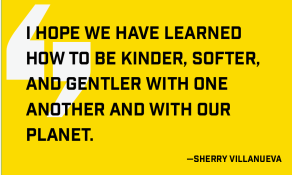
I fear that the economic impact of the restaurant industry will be so catastrophically damaging that the only survivors will be the large corporate chains and that the small independent restaurant will die forever. Independent restaurants have the passion, creativity, and ingenuity of the communities in which they live. They are the fabric of many neighborhoods and often define the personality and the very soul of the place in which they live. A ubiquitous, homogenous, corporate chain experience is not reflective of the vibrancy of our country.
I also fear that the connection to small farmers, winemakers, distillers, fishermen, and ranchers will be lost in a chain-dominant restaurant world and in addition to losing many of our independent restaurants, we will lose many of those artisan producers as well. Together they are the keepers of heritage, culture, passion, dedication and an inexplicable commitment to hospitality that comes from entrepreneurs and not from a corporate office somewhere else.
David Lea, Climate Professor, UCSB; Sustainable Transportation Advocate
Various reporting agencies and studies have projected that global carbon dioxide emissions will fall by about 6 percent in 2020, which would be the largest one-year drop ever recorded. But even with that drop, the effect on cumulative carbon dioxide emissions, which is what drives global warming, will be very modest.
It is possible, depending on the nature of the post-pandemic recovery and the pace of decarbonization efforts already underway, that 2019 will retrospectively become the year of peak global emissions. If so, that would be a remarkable turning point and far more significant than the 2020 drop alone.
The pandemic, as bad as it is, does provide an opportunity for a reset in behavior and policy, as well as accelerant for some trends that are already underway. These might include an accelerated build-out of renewable energy, greater reliance on active transport (i.e., walking and biking) in our community, and remote work and video conferencing in place of commuting and business/conference travel. In particular, there are unique opportunities right now to remake downtown Santa Barbara in a way that prioritizes people, housing, businesses, and active transport over cars. Imagine a State Street, for example, where residents and visitors alike can live, eat, play, attend public events, walk and bike, perhaps connected with other parts of downtown by a (hands) free autonomous streetcar.

The biggest long-term negative effects might be: (1) a move away from high-density housing and cities due to fear of future pandemics, with consequent growth of outlying communities that require longer commutes and that are not easily amenable to either public or active transport, let alone community-building; and (2) fear of public, shared transport and any new mode that moves away from individual ownership; e.g., shared autonomous and/or fleet vehicles.
Both of these changes would make it harder for California to reduce personal car use, congestion, emissions, and vehicle miles traveled, leaving electric cars as one of the few options remaining to reduce emissions.
Kathy Janega-Dykes, CEO, Visit Santa Barbara
The impact of the coronavirus is unprecedented for the tourism industry. The U.S. Travel Association estimates the economic fallout of this crisis will be nine times worse than the 9/11 terrorist attacks.
On a local front, the Santa Barbara South Coast’s hotels, restaurants, wine-tasting rooms, retail stores, attractions, and activities providers all are reeling from the impacts. Realistically, it will take multiple years for a full recovery. The pandemic and society’s adaptations to physical distancing may fundamentally change consumer behaviors and preferences.
When travel opens back up, we expect travel and leisure will look different. Some of those changes will be short term and others longer lasting. Safety and hygiene are going to be of paramount concern, at least in the short term. Area hospitality businesses will adapt their operations to provide safe environments to protect their workforce and customers, including residents and visitors.
Susan Cassels, Associate Geography Professor, UCSB
I fear that this pandemic will exacerbate health disparities. Even before the pandemic, people of color and the poor suffered from a number of preventable diseases disproportionately. We see the same patterns playing out with COVID-19. In the long run, both locally and globally, I fear that the economic and social damage to families will last a long time and lead to additional mental- and physical-health burdens for vulnerable populations.
Judy Egenolf, Human Rights Activist; Business Owner
I hope we have spent enough time sheltering in place that changes to our previous patterns are permanent. We’ve learned to use less, stay connected without a car, and conduct business effectively using technology in lieu of fossil fuels. I hope preparing healthy meals replaces less thoughtful consumption. We can accomplish much at this rational pace good for our health.
Zach Gill, Musician
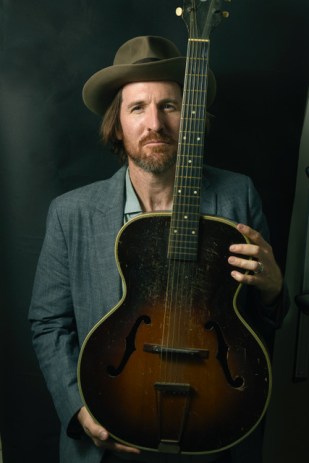
I believe that live music gatherings won’t really start to take place until late 2021 or 2022. This summer I think we’ll see people and bands gather in smaller clubs or outdoor settings, if there aren’t huge spikes in cases, then it will continue gradually, but given that tours are booked generally up to a year to six months in advance of the shows. I’d give it at least a year before it returns.
My hope is that with so many musicians home and the availability of home recording systems, some amazing music will get made. I also think that when we finally can gather to hear live music, its inherent magic will be renewed; we won’t take it for granted. At least I won’t as a performer.
I fear we will lose some of the smaller clubs and theaters of the world, places like SOhO and The Red Piano, they’re locally owned, and run and they are incredibly important for nurturing established and up-and-coming local talent. Most of the bigger venues of the world are connected with Live Nation or AEG, they have deeper pockets to weather this storm. I’d be sad to see the end of small, intimate clubs.
Gail Hansen, Co-Owner, SOhO Restaurant & Music Club
I believe that, when it is deemed safe to come out, the young people will be the first to want to be together. I feel they have less fear and are really yearning to be social with their friends. However, I don’t know if a room like ours — where for the standing/dancing shows, everyone is elbow to elbow — will eliminate our ability to actually have those kinds of shows. Perhaps, at least in the beginning, we may be only able to do seated type shows.
I fear it is a long time before a venue like SOhO will be able to be totally operational in its past capacity. Being a music venue, I believe we are some of the hardest-hit businesses. Without knowing when or if to book shows, we have an empty calendar.
I fear that it may be a long time before large venues can reopen. I fear that even if we can, people will still be afraid to come out and be together. I fear people will be afraid to hug each other again. I fear that people will wear masks forever. I fear we will be less likely to be near strangers. I fear living in a virtual world. I fear our world leaders.
Kristen Miller, CEO, Goleta and Santa Barbara Chamber of Commerce

I believe that there will be more mergers of business organizations and nonprofits in order to best serve the community who have less time and money to spread their interests and resources between agencies. I believe that chambers of commerce in the three counties — Ventura, Santa Barbara, and San Luis Obispo — will come together for regional collaboration about the economy and jobs. The new comfort level with virtual meeting software like Zoom and GoToMeeting will allow and promote more neighborly communication and the creativity that we always dreamed of but had a hard time implementing.
I hope that we all begin to truly appreciate how business and community are inexorably connected. No longer business versus the environment versus government versus community, the future will embrace a new understanding that what connects each of these entities is people — people we miss being near during this pandemic. Less divisiveness, more collaboration; less silos, more connectivity; less traffic, more remote workers; less waiting rooms, more telemedicine; less 9-to-5 downtowns, more habitable downtowns.
At the Santa Barbara Independent, our staff continues to cover every aspect of the COVID-19 pandemic. Support the important work we do by making a

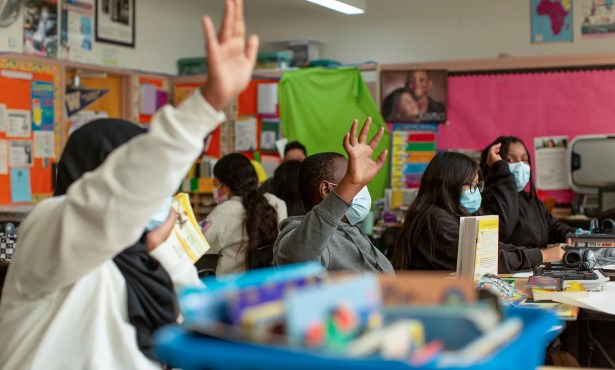
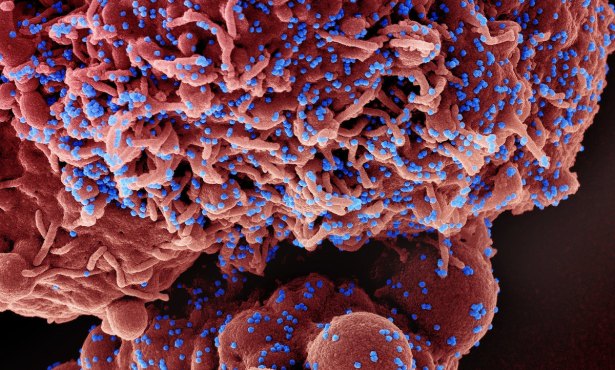
You must be logged in to post a comment.